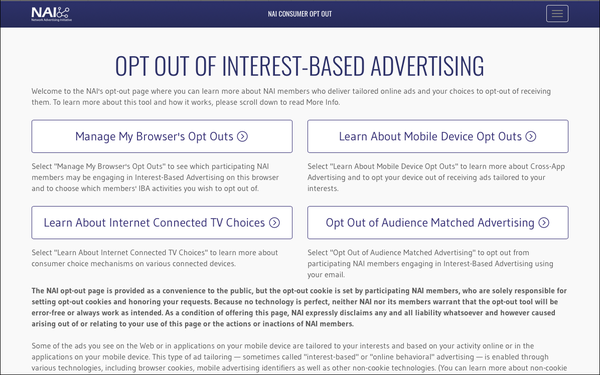NAI To Shut Down Opt-Out Tools
- by Wendy Davis @wendyndavis, May 8, 2025

The industry self-regulatory organization Network Advertising Initiative plans to shut down online opt-out pages that allow consumers to reject receiving ads based on their cross-site activity, as well as ads based on data linked to their email addresses.
“Continuing to operate the legacy opt-out tools does not align with the direction of NAI’s self-regulatory program going forward,” the organization said Wednesday in an email informing members of the move, which will take effect by September 15.
The organization added that its opt-out mechanisms were not designed with recent state privacy laws in mind, including statutes requiring online companies to honor signals that consumers send through mechanisms like the Global Privacy Control -- a browser-based tool that transmits opt-out commands to all sites consumers visit.
advertisement
advertisement
The group said its opt-out landing page will continue to offer information to consumers about online privacy options, including how to change browser settings, download extensions and use opt-out mechanisms operated by the umbrella group Digital Advertising Alliance. The organization also said that even after its opt-out pages sunset, members can continue to use the Digital Advertising Alliance's opt-out tools, at no additional cost.
The organization says its extension will provide “a balanced point of view on opting out,” and will not require "direct member integration."
Since 2018, 19 states have enacted comprehensive consumer privacy laws, according to the privacy focused nonprofit IAPP (formerly International Association of Privacy Professionals).
News of the Network Advertising Initiative's plans comes soon after it replaced its former privacy code -- which imposed restrictions on the collection and use of consumers' data -- with a framework that requires members to disclose how they process consumers' data, follow applicable state and federal laws, and have procedures to determine compliance.
The prior code broadly required companies to allow consumers to opt out of receiving ads based on non-sensitive data collected across sites and apps, and to obtain express consent from consumers before using sensitive data for ad targeting. The most recent update took effect in 2020, when the organization prohibited ad-tech companies and other members from sending behaviorally targeted ads to anyone younger than 16.
The self-regulatory organization, which launched 25 years ago with just 10 members, first unveiled a cookie-based opt-out page for behavioral advertising in 2001, after negotiating with the Federal Trade Commission. For now, that page allows consumers to reject behaviorally targeted ads from more than 50 members; the group's more recent email-based opt-out page allows consumers to opt out of more than 20 ad-tech platforms' use of email addresses for marketing.
Separately, the Digital Advertising Alliance also expects to offer an extension that enables the same universal opt-out functionality as the Global Privacy Control. That extension is currently undergoing testing, and could be available by this summer.


